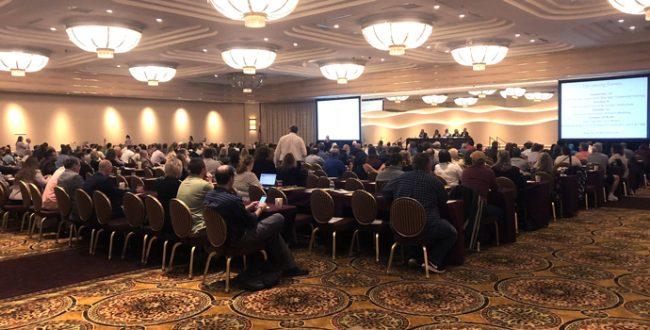UPDATED, Sept. 12, 2019, 1:01 p.m.: As bleary-eyed risk takers tried their luck on slot machines and blackjack tables at an Upstate New York casino on Tuesday morning, nearly 400 of the state’s landlords gathered across the hall, making a gamble of their own.
Crammed into the Turning Stone Resort Casino’s sparkling Oneida conference room, the landlords and their representatives met to discuss the state’s radically shifted rent laws at an event called “Unify Upstate Landlords.”
Albany-based trade group New York Capital Region Apartment Association organized the gathering; yellow donation forms for the group’s lobbying efforts were placed on each seat throughout the conference room. Platinum Properties was in attendance — as were a couple of out-of-staters: Chicago-based Institute of Real Estate Management and New Jersey-based Solomon Organization sent representatives. But big city names were eclipsed by numerous small landlords and brokers from upstate and western New York; Schenectady sent a delegation of 12 landlords, who sat in the first row.
The massive meeting — the scale of which bewildered the organizers — comes at a time when the real estate industry is grappling with rent reforms passed this summer that favor tenants and curb how landlords across the state can increase rents on stabilized housing stock.
Few at Tuesday’s gathering agreed on a remedy for the changes that were delivered to the industry with the stroke of Gov. Andrew Cuomo’s pen — and with a push from the state Senate’s new Democratic majority.
“The people who passed this legislation don’t believe in capitalism or free enterprise. And there’s nothing you can say to convince them,” said Stephen Eisenberg, a real estate attorney in Millerton, New York. The room erupted into thunderous applause as Eisenberg continued. “Their agenda is to destroy the private housing market in New York. Rather than lobbying on deaf ears, why not litigation?”
Debbie Pusatere, president of NYCRAA, said that while no decisions have been made on strategy to overturn the new legislation, the organization’s goal is to “try to come to a compromise” with lawmakers. The Utica session is the first step to bringing the upstate New York real estate industry together, according to Pusatere.
But crafting a statewide strategy for real estate may be difficult, as many cited a “dividing line” that separates upstate firms’ interests from downstate.

Hundreds of landlords discussed the rent law at a casino in Utica
According to Rebecca Garrard of Housing Justice for All, several tenants slipped into the event “incognito” to record it in its entirety and feed the intel to their statewide coalition. Upstate landlords are planning to appeal to lawmakers by highlighting the plight of tenants who will be denied leases as a result of the new law, Garrard said.
The event also drew management companies and trade groups from across the region, including the New York Mortgage Bankers’ Association, Rochester-based Roc Real Capital, Apartment Guide parent company RentPath, Binghamton’s Sall Associates and Syracuse multifamily firm CNY Asset Management.
Jaime Cain, an attorney at Rochester firm Boylan Code said she has been retained to challenge Section M of the Housing Stability and Tenant Protection Act of 2019, and noted that there has been no coordination with any of the downstate real estate trade associations. The Rent Stabilization Association, the Real Estate Board of New York and Community Home Improvement Program were all absent from the program. (RSA and CHIP, along with seven individual landlords, in July filed a suit challenging the new law’s constitutionality.)
“We’re not planning to work with downstate New York at all,” Cain said. “The hardest thing to swallow is that the laissez-faire attitude has been restricted and this is now all being dictated to the industry. But there is some hopefulness.”
Correction: This story has been updated to reflect that Glenwood Management was not in attendance.
